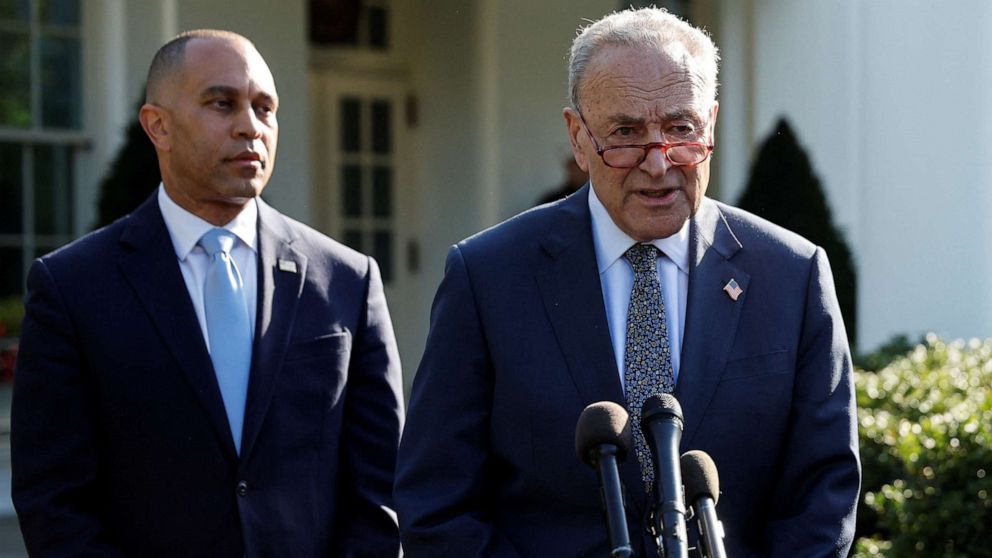周二两国总统的高风险会议乔·拜登国会领导人在债务上限问题上没有达成任何解决方案,因为美国正在努力争取在6月1日的最后期限前达成协议,否则将面临违约风险。
“与会的每个人都重申了他们的立场。我没有看到任何新的动向,”众议院议长凯文·麦卡锡在离开白宫时告诉记者。
拜登后来称会议“富有成效”,他告诉记者,他将在周五再次与领导人坐下来,他们的工作人员将在此期间每天会面,继续讨论。
当被问及达成协议的剩余时间不多时,他说,如果有必要,他将跳过下周前往日本会见七国集团领导人的长期计划。
“我仍然信守承诺,”他谈到这次旅行。"但显然这是议事日程上最重要的事情."
在短暂的会议结束后,双方都谈到了他们熟悉的话题,双方都表示对方有责任采取行动。
“众议院提高了债务上限,参议院没有,总统也没有进行谈判,”麦卡锡说,他指的是上个月勉强通过的《储蓄、限制、增长法案》(Save,limit,Grow Act),以提高债务上限,换取将联邦机构的资金减少到2022财年的水平,并将政府支出的增长限制在每年1%。
参议院多数党领袖查克·舒默(Chuck Schumer)和众议院少数党领袖哈基姆·杰弗里斯(Hakeem Jeffries)离开会议时,向他们的共和党对手发出了“将违约排除在外”的信息。
“底线很简单。两党之间有很大的分歧,”舒默谈到拜登和众议院共和党人提出的两份2024年预算提案时说。
“我们可以尝试在预算和拨款过程中达成一致,但利用违约风险,以及美国人民面临的所有危险,作为人质,并说这是我的方式或没有方式……是危险的,”舒默补充说。

众议院民主党领袖哈基姆·杰弗里斯(纽约州民主党)和参议院多数党领袖查克·舒默(纽约州民主党)在白宫与乔·拜登总统和国会领导人就债务限额问题进行会谈后,面对记者..
乔纳森·恩斯特/路透社
参议院少数党领袖米奇·麦康奈尔(Mitch McConnell)明确宣布,美国将“永远不会违约”。
“它从来没有,也永远不会,”麦康奈尔说。“然而,选举是有后果的。我们现在有分裂的政府。”
拜登表示,他对麦康奈尔的评论感到“高兴”,并表示“与会的每个人都明白违约的风险。”
拜登曾表示,提高债务上限是没有商量余地的,并告诉记者,他正在考虑第14修正案,以绕过债务上限,继续借钱-这是财政部长珍妮特·耶伦的解决方案被告知ABC将冒“违宪危机”的风险-但是诉讼需要时间。
尽管在债务上限问题上,双方似乎仍有很大分歧,但在会议之前,双方确实出现了一个罕见的一致点:反对短期解决方案。
“他必须停止忽视问题,”麦卡锡在周二的会议前谈到拜登时说。“那为什么还要继续踢罐子呢?现在就解决吧。”
白宫新闻秘书郭佳欣·让-皮埃尔在每日简报中告诉记者,“短期延长也不是我们的计划。这不是我们的计划。”
让-皮埃尔重申了拜登政府的观点,即国会有责任无条件地明确提高债务上限。
麦卡锡表示,他认为下周需要就此事达成原则协议,以避免违约,美国财政部长珍妮特·耶伦警告说,违约最早可能在6月1日发生,尽管政府无法支付所有账单的确切日期仍不确定。
政府官员警告说,如果美国违约,中国和俄罗斯等对手可能会从中渔利,经济学家认为会有这种情况深远的影响这可能引发全球金融危机。
“人们普遍认为,金融和经济混乱将随之而来,”耶伦周日在美国广播公司(ABC)的“本周”节目中表示。
如果美国历史上第一次违约,美国人在谁应该承担责任的问题上存在分歧。
最近的美国广播公司新闻/华盛顿邮报投票发现39%的人将主要归咎于国会的共和党人,而几乎同样多的36%的人说他们将主要归咎于拜登。16%的人自愿说他们会平等地指责双方。
High-stakes White House debt ceiling summit ends with no movement toward deal
A high-stakes meeting Tuesday between PresidentJoe Bidenand congressional leaders on the debt ceiling ended with no solution as the nation barrels toward a June 1 deadline to reach a deal or risk default.
"Everybody in this meeting reiterated the positions they were at. I didn't see any new movement," House Speaker Kevin McCarthy, R-Calif., told reporters as he left the White House.
Biden, who later labeled the meeting "productive," told reporters he'll sit down with the leaders again on Friday and their staffs will meet daily in the interim to continue discussions.
When asked about the short time left to reach a deal, he said he'd skip next week's long-scheduled trip to Japan to meet with G-7 leaders if necessary.
"I'm still committed," he said of the trip. "But obviously this is the single most important thing that is on the agenda."
Both parties dug into their familiar talking points as they emerged from the short meeting, with each side stating the other has the responsibility to act.
"The House raised the debt limit, the Senate has not and the president hadn't been negotiating," McCarthy said, pointing to the Save, Limit, Grow Act narrowly passed last month to raise the debt ceiling in exchange for reducing funding for federal agencies to 2022 fiscal year levels and limiting growth in government spending to 1% per year.
Senate Majority Leader Chuck Schumer and House Minority Leader Hakeem Jeffries left the meeting with a message to their Republican counterparts to "take default off the table."
"The bottom line is very simple. There are large differences between the parties," Schumer said of the two 2024 budget proposals offered by Biden and by House Republicans.
"We can try to come together on those in a budget and appropriations process, but to use the risk of default, with all the dangers that has for the American people, as a hostage and say it's my way or no way … is dangerous," Schumer added.
Senate Minority Leader Mitch McConnell categorically declared the U.S. would "never default."
"It never has, and it never will," McConnell said. "However, elections have consequences. We now have divided government."
Biden said he was "pleased" by McConnell's comments and said "everyone in the meeting understood the risk of default."
Biden has said raising the debt ceiling is non-negotiable, and told reporters he was considering the 14th Amendment to get around the debt ceiling and continue borrowing money -- a solution Treasury Secretary Janet Yellentold ABC would risk an "unconstitutional crisis"-- but that it would take time to get litigated.
While both sides still seemed miles apart on a debt ceiling fix, a rare point of agreement did emerge ahead of the meeting: opposition to a short-term solution.
"He's gotta stop ignoring problems," McCarthy said about Biden before the meeting Tuesday. "And why continue to kick the can down the road? Let's solve it now."
White House press secretary Karine Jean-Pierre told reporters during the daily briefing, "A short-term extension is not our plan, either. That is not our plan."
Jean-Pierre reiterated the Biden administration's view that it is Congress' duty to enact a clean raise to the debt ceiling without conditions.
McCarthy said he believed a deal in principle on the matter is needed by next week in order to avert default, which Treasury Secretary Janet Yellen warns could come as soon as June 1 though there's still uncertainty about the exact date when the government would be unable to pay all of its bills.
Administration officials have warned adversaries like China and Russia could take advantage if the U.S. were to default, and economists state there would bewide-reaching impactsthat could trigger a global financial crisis.
"It's widely agreed that financial and economic chaos would ensue," Yellen said Sunday on ABC's "This Week".
If the U.S. were to default for the first time in history, Americans are split on who would bear responsibility.
A recent ABC News/Washington Postpollfound 39% would mainly blame the Republicans in Congress, while virtually as many, 36%, say they'd mainly blame Biden. Sixteen percent volunteer that they'd blame both parties equally.






